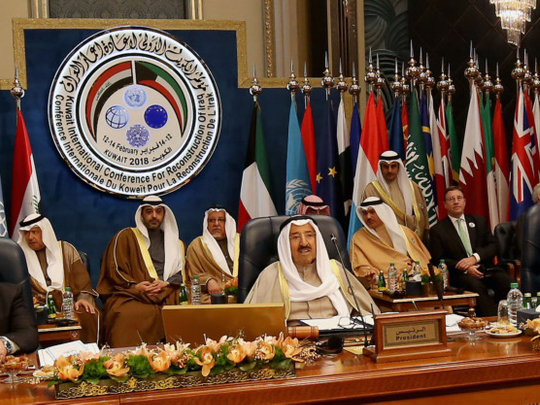
The London-based Asharq Al Awsat said that Iraqis must not be fooled by international conferences and commitments to reconstruct the country as similar promises had been made to different countries but never fulfilled.
“What’s worse than shortage of money is the mismanagement in Iraq itself. Who would want to invest money in a country where militias are deployed and corruption is rampant? There is sectarianism there and the government is weak. What can we notice when looking at the list of supporters? The only country that is not helping the Iraqis is Iran, which is the most responsible for Iraq’s destruction and for the failure of its central authority as it disintegrated Iraqi state institutions in order to control them and established a parallel army, such as the Popular Mobilisation that resembles Hezbollah in Lebanon and performs the same task.”
The conference in Kuwait resulted in generous commitments made by Saudi Arabia, Kuwait and the UAE to rebuild Iraq after the announcement that Daesh (the self-proclaimed Islamic State of Iraq and the Levant) has been defeated in the country, said Saudi Arabia’s Al Yaum. Perhaps this event that unified Iraqis confirms Saudi Arabia’s keenness in restoring Iraq’s pioneering role in the Arab Nation, noted the paper. “This would thwart those who are lying in wait and attempting to separate Iraq from the Arab fold — a move with intentions that contradict the country’s history and culture. The aid that will help this dearly beloved country recover will set a foundation for what Saudi Arabia is striving for: To make sure the Arab Nation is capable of recovering its strength and unifying its ranks so that it can be strong during this critical phase.”
Netanyahu faces bribery charges
Meanwhile, rumours in Israel have it that Prime Minister Benjamin Netanyahu is plagued by bribery charges for a long time, which surface every now and then in Israel with his political rivals trying to make the best of these accusations to bring him down from power, said the Jordan Times. “There is an apparent public fatigue of Netanyahu as a leader anyway, having occupied the office of prime minister for so many years. Irrespective of whether the accusations against him will hold up in a court of law or not, many Israelis feel that it is time for change. Of course, Netanyahu’s fall from the pinnacle of power would be of great service to the cause of peace — not only on the Palestinian front, but also regionally. The peace process between Israel and the Palestinians, or better still what’s left of it, has been stalled since Netanyahu’s rise to power in his country more than a decade ago.”
The Saudi Gazette said that now that the police has recommended that Netanyahu be indicted for bribery, fraud and breach of trust, he might not be around much longer. The paper noted that although United States President Donald Trump has been closer to Netanyahu than any other world leader, the evidence suggests that if Netanyahu is forced to leave office, Trump will not be shedding too many tears, the paper said.





_resources1_16a31069e4e_small.jpg)





